The Story of the Lost River
Reading Time: 8 min
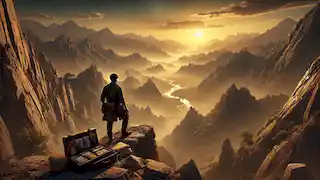
About Story: The Story of the Lost River is a Legend from iran set in the Contemporary. This Descriptive tale explores themes of Perseverance and is suitable for Adults. It offers Entertaining insights. A breathtaking quest to uncover Iran’s ancient and enigmatic Lost River.
The Lost River of Iran, or "Darya-ye Gomshodeh," has been a mystery woven into the fabric of Iran’s history and folklore. Said to have disappeared centuries ago, its legend persists in whispered tales and the cultural memory of ancient peoples. Where once its waters nurtured civilizations and gave life to verdant valleys, it now resides only in myths—elusive, untamed, and eternal.
This is the tale of one man’s quest to uncover its secrets. Ramin, a young historian, embarks on a perilous journey through rugged landscapes and forgotten lore, determined to unravel the enigma of the Lost River. His odyssey would take him deep into the Zagros Mountains, through underground labyrinths, and to the edge of reason itself. The Zagros Mountains, with their jagged peaks and ancient mysteries, had always beckoned adventurers and scholars. It was here, amid the rolling hills and secluded villages, that whispers of the Lost River were most vibrant. Ramin, a researcher from Tehran University, arrived in the small village of Mehran at dusk. The village was little more than a cluster of mud-brick homes surrounded by terraced fields. Children played under the fading light, and smoke curled lazily from chimneys. Yet beneath the pastoral calm lay a sense of guarded secrecy, as though the villagers held knowledge they dared not share. At the village square, Ramin met Pari, the eldest resident and keeper of local lore. Her weathered face was a map of time, her eyes sharp despite her years. She greeted Ramin with a knowing smile as he approached her with questions about the Lost River. “You’re not the first to come looking,” Pari said, stirring a pot of tea over an open fire. “The river is more than water. It’s life, memory, and something far beyond us. To search for it is to invite its burden.” Ramin took her words as the romantic musings of an elder steeped in tradition. “I’m here to document its history,” he said. “To understand its disappearance through science.” Pari laughed softly. “You may find its waters, young man, but its truth will evade you.” Ramin spent two days in Mehran gathering supplies and information. The villagers spoke in hushed tones about the river, offering fragments of stories. Some claimed it had been cursed by an ancient king, its waters swallowed by the earth after his hubris angered the gods. Others believed it was a divine test, a symbol of balance between humankind and nature. During his stay, Ramin hired a guide named Farhad. A wiry man in his late thirties, Farhad knew the mountains intimately. He had grown up in the region, herding sheep along its treacherous paths. Though skeptical of the quest, Farhad agreed to lead Ramin, warning him of the dangers that lay ahead. “The mountains are not kind to strangers,” Farhad said, his voice grave. “And neither is the river, if it still exists.” Equipped with maps, climbing gear, and weeks’ worth of provisions, the pair set off at dawn. Their destination was the Kuh-e Karkas range, where the river was said to have vanished. The journey began on a clear morning, the sun casting golden light over the rugged terrain. The trail wound through rocky outcrops and patches of wildflowers. Farhad led the way, his steps sure and deliberate. Ramin followed, marveling at the beauty of the landscape. For days, they trekked through valleys and over ridges. At night, they camped under a canopy of stars, the only sounds the crackling of the fire and the distant calls of nocturnal animals. Ramin recorded his thoughts in a leather-bound journal, sketching maps and noting the villagers’ stories. By the fifth day, the terrain grew harsher. The air became thin, and the paths narrowed to precarious ledges. Farhad pointed to a distant peak. “Kuh-e Karkas,” he said. “The river’s last known home lies beyond.” As they approached the mountain, signs of ancient habitation appeared. They found crumbling stone walls overgrown with moss and strange carvings etched into boulders. The symbols depicted waves, spirals, and human figures standing in reverence. “These must be from the Elamite period,” Ramin speculated, running his fingers over the carvings. “They revered water as sacred.” Farhad looked uneasy. “Sacred or not, these lands feel… heavy.” The sense of unease deepened as they reached the base of the mountain. The air grew humid, and the faint sound of rushing water reached their ears, though no streams were visible. They followed the sound until they came to a narrow cave entrance, partially concealed by thorny bushes. “This is it,” Farhad said. “The villagers call it Darreh-e Shab—‘Valley of the Night.’ Few dare to enter.” Inside the cave, the world shifted. The air was cool and damp, and their headlamps illuminated walls glistening with moisture. Stalactites hung like daggers, and the ground was uneven, covered in loose rocks and pools of water. Hours into their descent, the sound of rushing water grew louder. They followed the noise, navigating treacherous paths and crawling through narrow passages. At last, they entered a vast chamber where the Lost River roared into view. The sight was breathtaking. The river was a ribbon of blue light, its waters shimmering with an otherworldly glow. The chamber was illuminated by phosphorescent minerals, casting a soft, ethereal light. The air was thick with the smell of damp earth and something metallic. Ramin crouched by the water’s edge, his heart pounding. “It’s magnificent,” he whispered. “But how is it glowing?” Farhad stayed back, his face pale. “This place is not natural,” he muttered. “We should leave.” Ignoring Farhad’s warnings, Ramin began collecting samples and measurements. The water was unusually warm, with traces of rare minerals. He theorized that the river was heated by geothermal activity and enriched by subterranean deposits. But the river seemed almost alive. Its surface rippled without cause, and strange shadows moved in the corners of their vision. At times, Ramin thought he heard whispers mingling with the roar of the water. As they explored further, they found signs of an ancient civilization. Stone altars, broken pottery, and tools lay scattered along the riverbank. Ramin realized the river had been revered, perhaps even worshiped, by those who lived here long ago. “The river wasn’t just a resource,” he said. “It was a god.” Their discovery came at a cost. As they prepared to leave the chamber, the river’s roar grew deafening, and the ground began to tremble. Passages they had traversed earlier were now impassable, blocked by fallen rocks. Panic set in as they struggled to find an exit. Farhad cursed under his breath, his earlier warnings echoing in his mind. “The river is punishing us,” he said. “We shouldn’t have come.” Exhausted and disoriented, they stumbled through the labyrinth, the river’s whispers growing louder. It felt as though the cave itself was alive, shifting and twisting to keep them trapped. After hours of searching, they found an opening and emerged into the night, their bodies battered and their spirits shaken. Back in the village, Ramin shared his findings. His samples confirmed the presence of rare elements and volcanic activity, supporting his theory that the river had been rerouted underground by tectonic shifts. But his scientific explanations did little to satisfy the villagers. “You saw its power, didn’t you?” Pari asked, her eyes piercing. “The river is not just water. It is memory, spirit, and warning.” Ramin nodded, unable to articulate the haunting beauty of what he had seen. Despite his discoveries, the Lost River remained as enigmatic as ever—a force of nature that defied comprehension. The Lost River was mapped but never tamed. Its waters continued to flow unseen, carving paths through darkness and time. For the villagers of Mehran, it remained sacred—a guardian of balance and a reminder of humanity’s place in the world. For Ramin, it became an obsession. He published papers and presented his findings, but no explanation felt complete. The whispers of the river stayed with him, a haunting melody that played in his dreams. In the end, the Lost River was more than a geological marvel. It was a symbol of life’s enduring mysteries, a tale that would be told for generations to come.The Whispering Winds of the Zagros
Preparations and Partnerships
Into the Mountains
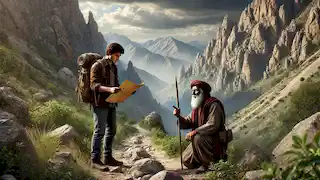
The Echo of Legends
Descent into Darkness
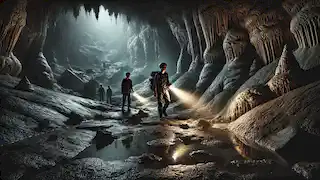
Secrets Beneath the Surface
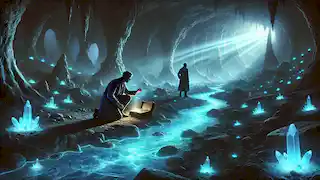
The Curse of the River
The River’s Legacy
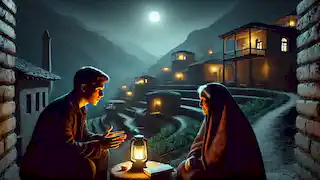
Epilogue: The Eternal Mystery

















